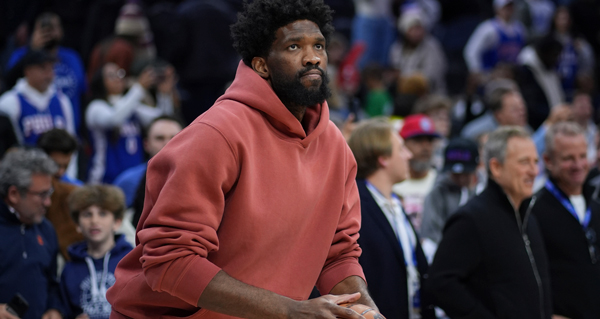Joel Embiid has embraced a more cautious approach to his knee rehabilitation following his second surgery in 14 months. Embiid is prioritizing long-term health over rushing back to the court for the upcoming season with the Philadelphia 76ers.
Embiid underwent his latest knee procedure in April after months of uncertainty and recurring swelling issues. Embiid told ESPN’s Dotun Akintoye in late June that he would not push his recovery timeline, marking a significant departure from previous injury management approaches.
“We’re not going to push anything,” Embiid said. “For my whole career, I felt like we never took that approach.”
The 76ers’ organization had previously expressed optimism about Embiid’s availability for training camp in September. However, the 30-year-old center declined to commit to any specific return date during recent interviews.
“We don’t have a timeline,” Embiid stated. “Hopefully, sooner rather than later.”
Embiid emphasized the business realities surrounding his recovery process. He acknowledged that returning too early without being fully healthy would ultimately hurt the team’s championship aspirations.
“If I come back early enough and I’m still not myself, guess what? You’re not winning any games,” he explained.
The injury struggles have taken a significant psychological toll on Embiid, who began working with a therapist on the recommendation of assistant GM Jameer Nelson. The decision came after Embiid initially resisted the idea of mental health treatment.
“I was, like, ‘There is no chance. I don’t believe in none of that,'” Embiid recalled about his initial reaction to therapy.
Despite his initial skepticism, Embiid has maintained his commitment to the therapeutic process. He credits the sessions with helping him understand the pressures that may have contributed to his current situation.
“To this day, I’m 100 percent committed to it,” Embiid said. “But I will not sit here and say that my belief is ever going to be 100 percent in therapy.”
The 2023 MVP winner admitted that external pressures to play through injuries may have worsened his condition. His decision to publicly announce his need for surgery to ESPN surprised the organization and highlighted communication issues between player and management.
“Feeding into the pressure of you got to play, got to go out there, can’t let people down and this and that,” Embiid said. “That’s probably one of the reasons why I’m in this position now.”
Embiid described his public statement as “a cry for help” after feeling unheard by the organization. The incident underscored ongoing tensions between the star player and the front office regarding injury management protocols.
Looking ahead, Embiid remains confident about his future despite the setbacks. He expressed faith in his recovery process and long-term basketball prospects while acknowledging the challenges ahead.
